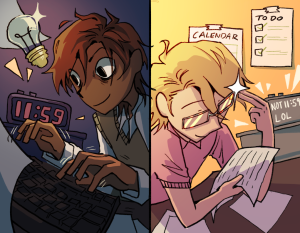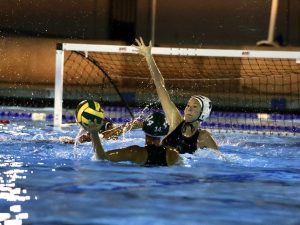Just say no to procrastination
April 10, 2023
No. There is a clear difference between procrastinating and getting your work done, and procrastinating and having nothing to show for yourself.
Chronic procrastination, whether active or passive, is not a time management strategy, but is instead an avoidance behavior, according to DePaul University psychology professor Joseph Ferrari.
“It really has nothing to do with time management,” Ferrari said to Forbes. “As I tell people, to tell the chronic procrastinator to ‘just do it’ would be like saying to a clinically depressed person, ‘cheer up.’”
Sure, there may be a handful of cases where a person can successfully put off a task and get it done on time, but procrastination often plays out with a snowball effect.
Carleton University Professor Timothy Pychyl lays it out like this: simply “giving in to feel good.” When we give into avoidance, we distract ourselves from responsibilities and give into temporary euphoria. These responsibilities aren’t going away, so the snowball of tasks begins to roll.
Active procrastination, while effective in theory for those who simply thrive under pressure, is also just too much of a risk to take. The concept of reserving the majority of your work for the night before is simply unsustainable, especially in group work.
Envision this: The night before a group presentation, you discover that NONE of your group members have done their work. This is an all too familiar tale for high school students who do their share of work and are forced to claw out of a sea of blank slides and documents that others explicitly took responsibility for.
This familiar scenario is a leading cause of induced negative perceptions of procrastinators, contributing to social tension and isolation. A study of Iranian University students found that “people who tend to put tasks off until the last moment may have lower self-esteem than their peers.”
But the act of procrastinating is often validated by those Youtube videos titled “I WAITED TILL THE NIGHT BEFORE TO WRITE A 20 PAGE RESEARCH PAPER.”
In these videos, the typically-caffeinated individual pulls an all-nighter and accomplishes the difficult feat. While the adrenaline rush of a creeping deadline can force efficiency, that doesn’t mean that these practices are healthy.
We’ve all heard the saying that tells us to not pull all-nighters to study for exams, and to instead get a good night’s sleep the night before. So why should this logic be any different?
A 2022 study of Swedish University students revealed that regardless of “severe”/passive procrastination or “less severe”/active procrastination, those who engaged in the act of procrastination were more likely to experience insomnia, muscle tension and downward spirals.
Furthermore, according to a Rowan University study on the effects of active and passive procrastination, “active procrastinators may believe they are delaying task completion because they feel they work well under pressure, while perhaps they are actually influenced by social factors and are surrounded by a weak support system.”
Especially in environments that require ample teamwork, procrastination – whether active or passive – is not the way to go. And as a piece of anecdotal evidence, The Howler adviser Marina Alburger always always says that in The Howler, for every minute you turn something in late, the next person is five minutes late.
Setting soft, periodic deadlines for yourself is important, and is overall healthier than hyper fixating on a singular, hard deadline. This isn’t to say you should beat yourself up when you procrastinate, but it’s easy to let procrastination get out of control, so it’s more important to minimize its influence before it becomes more severe.



![AAAAAND ANOTHER THING: [CENSORED] [REDACTED] [BABY SCREAMING] [SIRENS] [SILENCE].](https://thehowleronline.org/wp-content/uploads/2025/06/lucy-1200x800.jpg)
















































![AAAAAND ANOTHER THING: [CENSORED] [REDACTED] [BABY SCREAMING] [SIRENS] [SILENCE].](https://thehowleronline.org/wp-content/uploads/2025/06/lucy-300x200.jpg)



